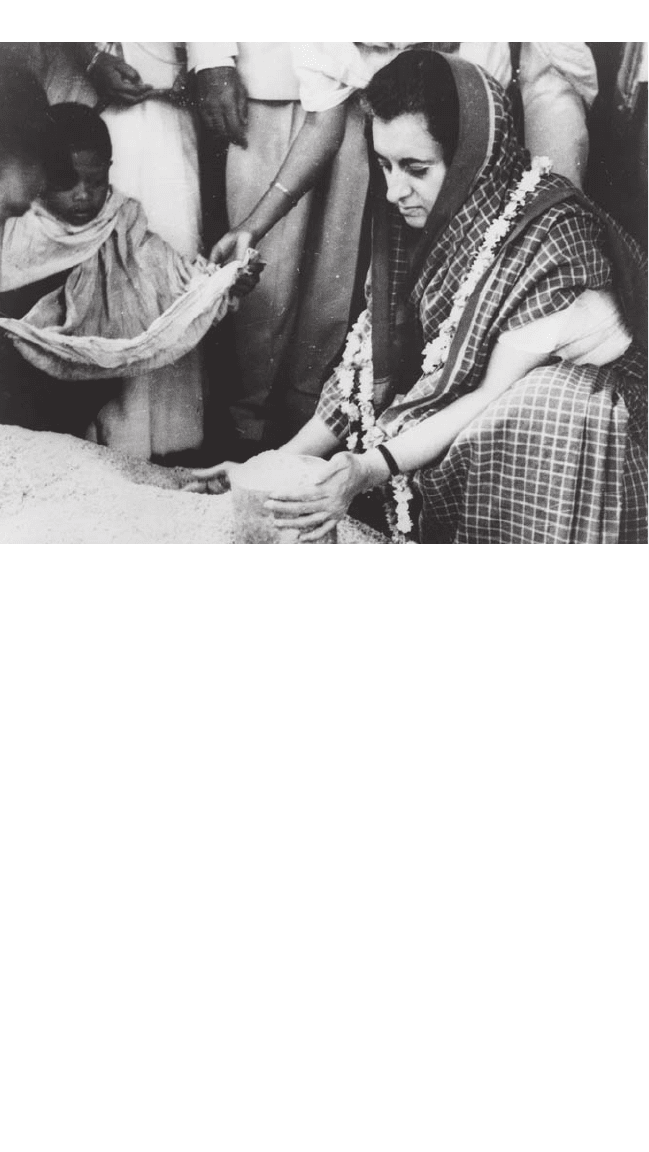Walsh J.E. A Brief History of India
Подождите немного. Документ загружается.


A BRIEF HISTORY OF INDIA
232
tons in 1950 to 82 million tons in 1960, in the same period the Indian
population grew from 361 to 439 million people. As population growth
negated most of the increased food production, India was forced to
import more food. Total food imports rose from 4.8 million tons in
1950 to 10.4 million tons in 1960. During 1965–68, as severe droughts
increased scarcity and drove food prices higher, India was forced to
import more than 11 percent of the food grains its people consumed,
much of it from the United States.
Nonalignment
Rather than commit India to the United States or the Union of Soviet
Socialist Republics (USSR) at the start of the cold war. Nehru advanced
a plan for “nonalignment” at a 1955 Indonesian meeting of Asian and
African nations. He envisioned a coalition of “third world” countries,
newly emerging from colonization and with India at its head, whose
members would pledge themselves to peaceful coexistence and mutual
territorial respect. A year earlier India and China had signed a treaty
that Nehru hoped would be the model for such relations; the treaty
recognized Tibet as part of China and pledged the two countries to
respect each other’s territorial integrity. “Hindi-Chini Bhai Bhai” (India
and China are brothers) was the slogan in India when it was signed.
The treaty, however, did not determine the actual boundary between
the two countries, in part because much of the 2,640-mile-long border
was remote and unmapped. Between 1955 and 1959 the Chinese made
repeated military incursions into territories claimed by India. In 1959
India granted political asylum to Tibet’s Buddhist religious leader, the
Dalai Lama. In fall 1962, after repeated talks had failed to resolve the
boundary disputes, Nehru ordered the Indian army to take back the ter-
ritories held by China. The Chinese easily defeated India’s army. They
took and kept the Karakoram Pass in the north, a route to Tibet that lay
through Indian Kashmir, and marched into Assam virtually unimpeded
before withdrawing on their own in November.
In May 1964, after a year of serious illness, Nehru died of heart dis-
ease. On the international scene his nonaligned policy was in tatters,
damaged by India’s invasion and seizure of Portuguese Goa in 1961 and
then destroyed by the Sino-Indian War of 1962. The defeat of India’s
army by the Chinese had also badly damaged his prestige at home. In
India evidence was mounting that the three fi ve-year plans had failed
to remake the Indian economy. It was a sad ending to the career of a
dedicated freedom fi ghter and statesman.
001-334_BH India.indd 232 11/16/10 12:42 PM

233
CONSTRUCTING THE NATION
Lal Bahadur Shastri
Lal Bahadur Shastri (1904–66), a former Gandhian and political mod-
erate from the United Provinces, had served in Nehru’s place during
the prime minister’s last illness. In 1964, on Nehru’s death, Shastri was
elected head of the Congress Party and became prime minister. Shastri’s
brief tenure in offi ce (1964–66) was marred by an escalating food cri-
sis as poor monsoons produced increasing food shortages and prices
soared. His government also faced South India protests against a gov-
ernment plan to make Hindi the offi cial language of India; his govern-
ment ended the protest by resolving that each province could use three
languages: English (as an associate language), a regional language, and
Hindi. Finally, a three-week war with Pakistan in September 1965 over
India’s refusal to conduct a plebiscite in Kashmir saw Indian troops
victoriously driving back Pakistani forces almost to Pakistan’s capital at
Lahore. A 1966 truce, mediated by the USSR at a meeting in Tashkent,
returned Kashmir to the status quo before the fi ghting started.
Indira Gandhi
Prime Minister Shastri died suddenly of a heart attack in January 1966
just at the conclusion of the Tashkent meetings. The “Syndicate,” the
nickname for the four Congress bosses from different states who had
controlled the Congress Party since Nehru’s last years, chose Jawaharlal
Nehru’s only child, Indira Gandhi (1917–84), to be the next prime
minister. At the time Indira Gandhi was a 48-year-old widow with
two sons. Her husband, Feroze Shah Gandhi, who was not related
to Mohandas Gandhi, had died suddenly in 1960. Indira Gandhi had
spent much of her adult life, even while her husband was alive, as her
father’s hostess and housekeeper. In January, the Syndicate bosses chose
her over Morarji Desai (1896–1995), the irascible 69-year-old leader of
Congress’s right wing, because of her family connections and because
they believed they could more easily bend her to their will.
The Green Revolution
Indira Gandhi came to power in 1966 as successive monsoon fail-
ures and severe droughts brought sections of the country to near
famine conditions. To gain food aid from the United States and the
International Monetary Fund (IMF) she had to agree to devalue the
rupee and to loosen government restrictions on foreign investment.
Dependence on foreign grain and foreign aid limited her government’s
001-334_BH India.indd 233 11/16/10 12:42 PM

A BRIEF HISTORY OF INDIA
234
ability to plan long term, and for three years (1966–69) the fi ve-year
plans were abandoned, and budgets were only year to year. Even
after 1969 the ambitious centralized planning of the Nehru years was
largely abandoned.
By the mid 1960s new strains of wheat (and later rice) had been
developed in Mexico and the Philippines that when used with intensive
irrigation, chemical fertilizers, and pesticides produced much higher
crop yields. Beginning in 1965 these new strains of wheat were used in
northern India from the Punjab and Haryana to western Uttar Pradesh.
Over the next four years India used loans from the IMF and the United
States to fund an intensive program of investment in new agricultural
technologies. Crops increased dramatically, particularly in the Punjab,
and by 1970 India was growing fi ve times as much wheat as in 1960. By
the 1970s Indian food production had made the country a net exporter
of agricultural products. In the 1980s new strains of high-yield rice
were introduced into India, doubling production of that crop.
A WOMAN IN OFFICE
F
or more than 15 years Indira Gandhi was India’s prime minister,
holding her country’s highest political offi ce at a time when many
village women were still not allowed to read or write. Gandhi was made
prime minister by Congress Party bosses (the so-called Syndicate) who
believed that, as a woman, she would be pliable and easily managed.
Syndicate bosses soon learned otherwise. Gandhi also learned, as she
matured as a politician, how to use her age and gender to advantage
with Indian voters, presenting herself, on occasion, as a compassionate,
self-sacrifi cing mother struggling to maintain peace within a fractious
extended family. As she told one crowd during the 1967 election,
Your burdens are comparatively light, because your families are
limited and viable. But my burden is manifold because crores [tens
of millions] of my family members are poverty stricken and I have
to look after them. Since they belong to different castes and creeds,
they sometimes fi ght among themselves, and I have to intervene
especially to look after the weaker members of my family, so that
the stronger ones do not take advantage of them.
Source: Frank, Katherine. Indira: The Life of Indira Nehru Gandhi (Boston:
Houghton Miffl in, 2002), p. 303.
001-334_BH India.indd 234 11/16/10 12:42 PM

235
CONSTRUCTING THE NATION
The “Green Revolution,” as the switch to high-yielding crops was
called, made Punjabi farmers the wealthiest in the nation. By the 1970s
Punjab’s peasant families earned twice as much as peasant households in
other parts of India. The increase in Indian food production was dramatic.
Nevertheless, the Green Revolution had some disadvantages. It increased
Indian dependence on chemical fertilizer dramatically and made farmers
rely on strains of wheat and rice that later showed themselves to be more
susceptible to disease and drought. Nor could Green Revolution innova-
tions be used throughout India; only regions where landholdings were
relatively large and peasants prosperous enough to invest in new tech-
nologies could use the new crops. Finally, the overall benefi ts for Indians
consumers were somewhat undercut by continuing population increases,
which used up much of the greater availability of food.
Indira Gandhi Moves Left
Despite the Syndicate’s belief that she would defer to their advice and
leadership, Gandhi quickly emerged as a powerful and independent
politician. In the election of 1967, held as India’s food crisis worsened,
Congress retained its majority by its smallest margin ever: 20 seats. It lost
seats to opposition parties on the right—the free-market Swatantra Party
and the Hindu communalist Jana Sangh—and on the left—communist
parties in West Bengal and Kerala. In Madras an anti-Brahman party, the
Dravida Munnetra Kazhagam (Party for the Progress of Dravidam, or
Food Production Growth, 1950–2000
1950 1960 1970 1980 1990 2000
Food grain production
(in millions of tons) 50.8 82.0 108.4 129.6 176.4 201.6
Food grain imports
(in millions of tons) 4.8 10.4 7.5 .8 0.3 –
Food grain reserves
(in millions of tons) – 2.0 – 15.5 20.8 40.0
Population
(in millions) 361.0 439.0 548.0 683.0 846.0 1,000.0
Source: INSA (2001, 215).
Note that the 2001 census report summarizing population growth over past censuses
reported the population (in millions) for the year 1991 at 843.
001-334_BH India.indd 235 11/16/10 12:42 PM

A BRIEF HISTORY OF INDIA
236
DMK), took power. In the new (1966) state of the Punjab, the Sikh party
Akali Dal took control. In Uttar Pradesh (formerly the United Provinces),
Chaudhuri Charan Singh withdrew from Congress, formed a new peas-
ant-oriented party, and became chief minister of the state.
To regain political popularity and against the advice and wishes of
Syndicate leaders, Gandhi moved to the left. Between 1967 and 1973
she gathered around her a “Kashmiri mafi a.” These new advisers were
leftist in their political convictions, often from Kashmiri Brahman
backgrounds and, as former supporters of her father, saw her as his suc-
cessor (Frank 2002, 312). Chief among these was her private secretary
and longtime friend, Parmeshwar Narain (P. N.) Haksar. With Haksar’s
help, Gandhi proposed an ambitious economic plan that included land
reform and ceilings on personal income, property, and corporate prof-
its. In 1969 she nationalized 14 of the country’s private banks—among
them the Bank of India—an immensely popular move in rural areas
where private banks had long refused to open branches. In 1970 she
used a presidential order to abolish the privy purses awarded to former
THE END OF THE PRINCES
I
n 1970 there were 278 princes in India collecting annual tax-free
privy purses ranging from $25 to $350,000 but totaling altogether
more than $6 million. Indira Gandhi’s fi rst attempt at ending the
princes’ purses passed the Lok Sabha but was defeated by one vote
in the Rajya Sabha, Parliament’s upper house. She then used a presi-
dential proclamation to strip the princes of their purses, privileges,
and titles. In 1971 the courts declared the proclamation illegal, but
by then Gandhi controlled Parliament. She had the Lok Sabha amend
the Indian Constitution to give the lower house the power to alter
the fundamental rights granted to citizens under the constitution and
to exclude such alterations from judicial review. The Lok Sabha then
passed another constitutional amendment, the 26th, abolishing the
princes’ privy purses and their privileges.
Like Gandhi’s nationalization of the private banks, the abolition of
the privy purses was enormously popular and enhanced her standing
with left-wing groups but carried little political risk. Neither princes
nor bank owners commanded suffi cient political constituencies to act
against her.
001-334_BH India.indd 236 11/16/10 12:42 PM

237
CONSTRUCTING THE NATION
Indian princes at independence. When state ministers opposed her
proposals for land reforms, Gandhi called for elections.
By the elections of 1971 Gandhi had been expelled from the old
Congress Party, which split into the Congress (O), led by Morarji Desai,
and her own Congress (R). (The R stood for “requisitioned.” Gandhi
had inaugurated her branch of Congress by sending around a requisi-
tion asking her supporters to meet. The O in Desai’s Congress stood for
“organization”—the assumption being that the Syndicate controlled
the original regional Congress organization.) Gandhi ran for elections
under her own party against the old Congress bosses. Her platform
consisted of a leftist program of goals and economic reforms. One cam-
paign slogan was “Garibi hatao” (Abolish poverty) (Frank 2002, 325).
Her election speeches called for slum clearance, the building of better
dwellings for slum residents, and the settlement of landless laborers
on their own property. Her campaign was a spectacular success, giving
Gandhi’s Congress (R) Party 325 seats in the Lok Sabha and an over-
whelming two-thirds majority of the popular vote.
Bangladesh and the 1971 Indo-Pak War
By 1970 Pakistan had discovered that religion alone was not suffi cient
to hold together two regions 1,000 miles apart with opposing economic
interests, different languages, and distinct cultural traditions. East
Pakistan had 60 percent of the country’s population but found itself
dominated economically and politically by West Pakistan. These con-
fl icts came to a head in 1970 when the East Pakistani leader Mujibur
Rahman (1920–75) and his political party won Pakistan’s fi rst parlia-
mentary election but was not allowed by Pakistan’s president, Agha
Mohammad Yahya Khan (1917–80), to form a government. President
Yahya Khan imposed martial law on East Pakistan, so on March 25,
1971, Sheikh Mujib, as he was called, declared independence for East
Pakistan, present-day Bangladesh (Bengal country). West Pakistani
troops entered East Pakistan and burned, looted, and murdered its
citizens in cities, university centers, and bazaars across the province.
Sheikh Mujib was arrested and jailed. By December 1971, 10 million
East Pakistanis had fl ed across the border into India.
The U.S. government under President Richard Nixon supported West
Pakistan. To gain support against the United States, Prime Minister
Gandhi broke India’s tradition of nonalignment to sign a 20-year treaty
with the USSR in which each country agreed to aid the other in case
of attack. At the same time India covertly supported the Bangladeshi
001-334_BH India.indd 237 11/16/10 12:42 PM

A BRIEF HISTORY OF INDIA
238
uprising with funds, training, and equipment. In retaliation Pakistan
declared war on India in December, bombing Indian airfi elds in the
west. The Indian army entered East Pakistan, completely overwhelming
the Pakistani army, which surrendered in mid-December 1971. India
then declared a cease-fi re, and Bangladesh was declared an independent
country. Gandhi’s military victory over Pakistan was wildly popular in
India. In the 1972 state assembly elections the Congress (R) Party won
70 percent of the seats; her party was now incontestably dominant in
both the center and the states.
The Emergency
Gandhi’s political fortunes reached their zenith in the 1971 elections.
The years following 1972 brought economic disasters and with them
political crisis. Three years of monsoon failures (1972–74) again
brought food shortages, rising food prices, and near famine to many
Indian regions. The Arab-Israeli war of 1973 raised the cost of oil-based
chemical fertilizers and, with it, the price of Indian foods. Infl ation
reached 20 percent per year. The government imposed curbs on salaries
and incomes and cut expenditures. Strikes became commonplace, and
factories closed throughout the country. In 1974 Gandhi received an
emergency loan from the IMF but only on condition that the govern-
ment retreat from its aggressive economic policies and curtail govern-
ment expenditures even further. Not only had Gandhi not abolished
poverty in her years in power; under her government economic condi-
tions had worsened for virtually all classes of Indian citizens.
Even before the crises of 1972–76, Gandhi had wanted absolute loy-
alty from the members of her central government and from Congress
(R) ministries in regional states. Over the years since 1967 she had
abandoned internal party democracy, fi lling party positions by appoint-
ment from above rather than by elections. She had undercut her party’s
grassroots organization by systematically replacing regional Congress
state leaders who had their own independent local networks with
people loyal to and dependent only on her. She created a pyramid-
like decision-making structure both in Congress and the government
to ensure that all matters, even if regional, would be decided in New
Delhi. A provision from the 1935 Government of India Act allowed the
central government to take over a state under emergency conditions.
By 1972 Gandhi was routinely using this provision to proclaim “presi-
dent’s rule” in any state that opposed her. By 1976, as one observer
noted at the time, all dissent, whether outside Congress or within, was
001-334_BH India.indd 238 11/16/10 12:42 PM

239
CONSTRUCTING THE NATION
interpreted as “anti-party, anti-national, and traitorous, or even foreign-
inspired” (Kochanek 2002, 100).
Gandhi’s centralization of Congress worked against her in several
ways. It made her programs more diffi cult to implement at state and
local levels because her appointees there had only weak local support.
Centralization also put government patronage and licensing regulations
directly into the hands of Gandhi’s close associates, making her gov-
ernment more vulnerable to corruption. Government corruption was
among the main complaints against her government; Gandhi’s younger
son, Sanjay (1946–80), was among those most frequently rumored to
Indira Gandhi distributes food, 1966, scooping rice into containers for distribution to children
at a food distribution center in Calcutta (now Kolkata). Repeated food shortages (1966,
1972–76) marked the fi rst decade of Gandhi’s tenure in offi ce. During the decade from
1966 to 1976, Gandhi learned how to present herself politically to the Indian electorate
through the image/metaphor of a mother feeding her nation/children. She adopted slogans
and programs aimed at ameliorating the lives of the poorest Indians (“Garibi hatao”—
Abolish poverty). Even during the Emergency of 1975–77, Gandhi’s government took actions
aimed at curbing the abuses of rural landlords, black-market operators, and smugglers. But
after her return to power in 1980, she abandoned this earlier agenda and instead used
appeals to communalism and religion to keep herself in power.
(Library of Congress)
001-334_BH India.indd 239 11/16/10 12:42 PM

A BRIEF HISTORY OF INDIA
240
be using government infl uence and connections to obtain quasi-legal
loans and land deals.
Opposition to Gandhi and her government in 1973–74 crystal-
lized around food shortages, rising prices, and corruption. Not even
the detonation of an underground nuclear device on May 18, 1974,
which made India the world’s sixth nuclear power, could distract the
Indian public from escalating infl ation, strikes, and protests. In Bihar,
Jayaprakash (J. P.) Narayan (1902–79), a Gandhian and founder of the
Socialist Party, came out of retirement to take over a growing protest
movement and invite peasants to join in protests against offi cial cor-
ruption and Gandhi’s authoritarian rule. In Gujarat students rioted
over the 30 percent annual infl ation rate and government corruption.
A massive strike of railway workers paralyzed the nation for 20 days
in mid-1974, ending only after the government jailed 30,000–40,000
striking workers. By 1975 Narayan’s movement had become national
as he and Morarji Desai brought protesters together with opposition
parties—among them Congress (O), the Jan Sangh, and the Swatantra
Party—to form the Janata Morcha (People’s Front).
In June 1975 the Allahabad High Court in Uttar Pradesh found
Gandhi guilty (on a technicality) of corrupt elections practices in the
1971 elections; the court invalidated her election to Parliament and
barred her from offi ce for six years. In New Delhi as Sanjay Gandhi
tried to organize rallies in his mother’s defense, the Janata Morcha held
a mass rally at which Narayan urged the police and the army to join
in a national satyagraha against government corruption. “We intend to
overthrow her,” Gandhi’s old enemy Desai had told an interviewer some
days before, “to force her to resign. For good. The lady won’t survive
this movement of ours” (Frank 2002, 374).
Faced with the imminent loss of both her offi ce and her political
career, Gandhi had the president of India issue an offi cial proclamation
“that a grave emergency exists whereby the security of India is threat-
ened by internal disturbances” (Jayakar 1993, 199). Using Article 352
of the Indian Constitution, which authorized the government to sus-
pend civil rights and take all necessary steps to preserve order, Gandhi
declared a national emergency on June 25, 1975. She jailed her oppo-
nents and took complete control of the government. Narayan, Desai,
600 opposition members of Parliament, and tens of thousands of local
party workers were detained without trial. Censorship laws closed all
news outlets. Parliament, now composed only of Gandhi’s supporters,
nullifi ed the election charges against her, and Gandhi postponed sched-
uled parliamentary and state legislative elections indefi nitely.
001-334_BH India.indd 240 11/16/10 12:42 PM

241
CONSTRUCTING THE NATION
The Emergency, as it is referred to, lasted until January 1977. Gandhi
banned the Hindu nationalist RSS group—which had provided strong
local support for the Janata movement—along with a range of communal-
ist and terrorist groups. The Maintenance of Internal Security Act (MISA)
and the Prevention of Smuggling Activities Act gave the government broad
powers to arrest and detain individuals. Strikes were banned, bureaucrats
were ordered to work harder, black-market operators and smugglers
were jailed, tax evaders were arrested, and in rural areas the power of the
wealthiest landlords was curbed. Industrial production grew an average of
8 percent per year. “She stood between Chaos and Order,” declared one of
many Emergency posters (Wolpert 2009, 419). Between 1975 and 1977,
stringent government policies (with help from a good monsoon) brought
the prices of essential commodities down to 1971 levels.
During the Emergency Sanjay Gandhi, the prime minister’s younger
son, became her closest adviser and an active political fi gure. A col-
lege dropout with a reputation for using threats, smears, and organized
violence in his business dealings, Sanjay Gandhi resurrected the Youth
Congress (now made up, according to one contemporary, of “dropouts,
drifters, and roughnecks”) to help implement his plans (Malhotra 1989,
177). He pursued what his supporters called urban beautifi cation and
family planning among the poorest Indians in urban slums and rural
villages. Under his program the bustees (slums), small shacks, and store-
fronts of the poor—the very Muslims, minorities, and low-caste voters
who had been his mother’s strongest supporters—were bulldozed in
urban cities such as New Delhi, Calcutta, and Varanasi and their tenants
forced to move elsewhere. In the Turkaman Gate section of Old Delhi the
destruction of 150,000 shacks and the forcible relocation of 70,000 slum
dwellers caused riots that put the area under a 24-hour curfew. Sanjay
Gandhi’s family planning initiatives were equally harsh. Government
workers were given sterilization quotas to meet in order to collect their
salaries. Vasectomy tents were set up in cities, and sterilization vans
roamed the countryside. Over two years more than 10 million steriliza-
tions were performed, many, according to rumors, under compulsion.
Janata Government
In January 1977 Prime Minister Gandhi suddenly announced that new
elections for Parliament would be held in two months. She ordered
well-known political prisoners released and suspended press censor-
ship. Narayan and Desai reformed the Janata coalition to fi ght in the
election. Shortly before the voting began, Jagjivan Ram, an Untouchable
001-334_BH India.indd 241 11/16/10 12:42 PM
